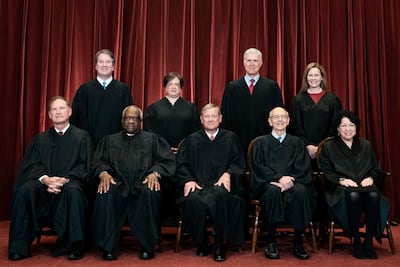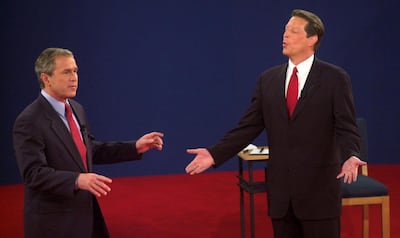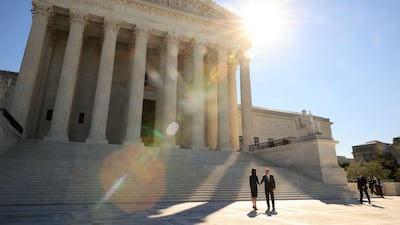The US Supreme Court cloaks itself in a mystique of wisdom, erudition and impartiality. But increasingly, skepticism surrounds this aura of wonder, which is good because this smokescreen can be not just ridiculous but dangerous.
The US Constitution ensures that the Court, apex of the judicial branch of the federal government, is entirely political. That should be obvious and was for most of US history.
But mainly in the 20th century, the mystique was carefully constructed (partially to defend its role as a vanguard of liberalism), principally by the Court itself.
The Court is as partisan as Congress and the White House. But judges on both sides have been complaining that the public is seeing through their veneer of lofty evenhandedness.
Justices Clarence Thomas and Amy Coney Barrett, two right-wing activists steeped in the Republican agenda, both insisted, in irony-rich speeches that they and their colleagues never rule according to their opinions, though other judges might. Yet, such claims are patently untrue.

Retiring Justice Stephen Breyer, a stalwart liberal, also complained that judges are too-often assumed to be politically motivated and warned that major reforms could backfire. Yet, he too, has plainly been guided by the evolving Democratic perspective, as have his colleagues Elena Kagan and Sonia Sotomayor.
The justices, left and right, rarely admit it, but they are politically-aligned. And at least to some extent, they are supposed to be. And that understanding must urgently be reclaimed.
The makeup of the Supreme Court is produced by the political process. Justices are nominated by the president and approved by the Senate. It is hard to imagine a more political procedure.
Courts have typically reflected those origins, except when some Republican-appointed judges proved more liberal than expected on civil and women's rights. The political right successfully organised to ensure that would never happen again.
In the 21st century, the veil has completely fallen off, thanks to a set of partisan outcome and process-related cases with immediate political consequences, akin to votes in Congress. Time and again, these supposedly neutral scholars invariably voted precisely along partisan lines.

The most notorious instance is Bush versus Gore, through which the Supreme Court decided the outcome of the 2000 presidential election. The contest between George W Bush and Al Gore in the deciding state of Florida was impossibly close and recounts based on various criteria could have swung the election either way.
The court stopped recounts and effectively ratified an extremely dubious vote certification by Florida Secretary of State Katherine Harris, who had used her power on behalf of Mr Bush.
The court not only selected the president along partisan lines, by ruling against the Florida courts, Republicans blithely abandoned their supposedly-principled opposition to federal intervention in state-run elections, while Democrats flipped the other way.
The ruling would be inexplicable but for raw partisan politics. Republicans voted to ensure a Republican victory and Democrats tried to block that. Only the most naive could thereafter consider the court remotely nonpartisan or impartial.
That has been compounded many times since, with justices on both sides invariably repeating this partisan bias, above all in cases involving core processes and outcomes.
Ideologically-inflected policy cases, such as on abortion rights, are less stark and subject to more compromise. But when it comes to their friends winning and losing, justices are as reliable as any apparatchik.
Republican Senate leader Mitch McConnell further cemented the raw politics of the Supreme Court by treating the confirmation process as a political game. He denied Barack Obama's nominee, Merrick Garland, consideration on grounds that it was a presidential election year, and then rushed Ms Barrett’s confirmation when 2021 voting was already underway.
This is manipulation of the clock, worthy of the end of a basketball game.
Such partisanship is particularly worrying as both Democrats and Republicans are indulging in ruthless partisan gerrymandering in many states, rendering many crucial elections noncompetitive. Fortunately, state courts, most recently in North Carolina, are defending the right of voters to select their leaders and not allowing politicians to pick their own voters.
These cases are likely to end up before the Supreme Court. Because that is widely presumed to advantage Republican power, the right-wing majority will surely insist that state legislatures have an absolute right to regulate elections, and the state courts overstepped their bounds. Unfortunately, Democratic justices wouldn’t necessarily rule in a more principled manner if the roles were reversed.
Finally, the composition of the court has received its ugliest political patina in years after President Joe Biden confirmed he will fulfil his campaign pledge to nominate a black woman to replace the retiring Mr Breyer.
Many Republicans have erupted in outrage, calling this racism, discrimination against white people, offensive and that any such nominee will be the beneficiary of "affirmative action" efforts to break down discriminatory barriers (another important public policy facing a likely defeat at the Supreme Court). The racism is undisguised.
Mr Biden's pledge is not any of that, but it is both political and traditional. Former US Presidents Ronald Reagan and Donald Trump both promised to appoint (white) women and did, to general approval. Historically, factors such as geography were cited to justify Supreme Court nominations.
It is not surprising that a generic empowered black woman appears acutely alarming to the white-grievance oriented Republican Party. Still, it is rich to hear complaining about identity-based preferences from white Christian American men, who have historically monopolised all positions of power, including at the Court.
New York Times columnist Jamelle Bouie, who specialises in reading present-day controversies through deep US history, recently argued that the court is and always has been entirely political, especially regarding the nomination of justices.
The whole mystique of a Supreme Court that is impartial and majestically above the political fray has been an illusion, and hence the source of considerable confusion and mischief.
From the founding of the Republic, by design, and certainly since the 1803 Marbury versus Madison case that established its broad authority, the Supreme Court has been supremely political. Pretending otherwise is either manipulative or foolish.
The current Court has become a menace to the values and interests of the large American majority. Reforms are essential. They could range from term limits or mandatory retirement ages to expanding the number of justices.
In any event, demystifying the Court and recognising, once again, that it is an entirely political body is a necessary first step towards reining in its excesses.


